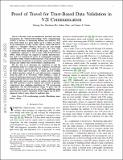| dc.contributor.author | Suo, Dajiang | |
| dc.contributor.author | Mo, Baichuan | |
| dc.contributor.author | Zhao, Jinhua | |
| dc.contributor.author | Sarma, Sanjay E. | |
| dc.date.accessioned | 2024-04-19T20:24:38Z | |
| dc.date.available | 2024-04-19T20:24:38Z | |
| dc.date.issued | 2023-06-01 | |
| dc.identifier.issn | 2327-4662 | |
| dc.identifier.issn | 2372-2541 | |
| dc.identifier.uri | https://hdl.handle.net/1721.1/154259 | |
| dc.description.abstract | Previous work on misbehavior detection and trust management for Vehicle-to-Everything (V2X) communication security is effective in identifying falsified and malicious V2X data. Each vehicle in a given region can be a witness to report on the misbehavior of other nearby vehicles, which will then be added to a "blacklist." However, there may not exist enough witness vehicles that are willing to opt-in in the early stage of connected-vehicle deployment. In this paper, we propose a "whitelisting" approach to V2X security, titled Proof-of-Travel (POT), which leverages the support of roadside infrastructure. Our goal is to transform the power of cryptography techniques embedded within Vehicle-to-Infrastructure (V2I) protocols into game-theoretic mechanisms to incentivize connected-vehicle data sharing and validate data trustworthiness simultaneously.
The key idea is to determine the reputation of and the contribution made by a vehicle based on its distance traveled and the information it shared through V2I channels. In particular, the total vehicle miles traveled for a vehicle must be testified by digital signatures signed by each infrastructure component along the path of its movement. While building a chain of proofs of spatial movement creates burdens for malicious vehicles, acquiring proofs does not result in extra costs for normal vehicles, which naturally want to move from the origin to the destination. The POT protocol is used to enhance the security of previous voting-based data validation algorithms for V2I crowdsensing applications. For the POT-enhanced voting, we prove that all vehicles choosing to cheat are not a pure Nash equilibrium using game-theoretic analysis. Simulation results suggest that the POT-enhanced voting is more robust to malicious data. | en_US |
| dc.language.iso | en | |
| dc.publisher | Institute of Electrical and Electronics Engineers | en_US |
| dc.relation.isversionof | 10.1109/jiot.2023.3236623 | en_US |
| dc.rights | Creative Commons Attribution-Noncommercial-ShareAlike | en_US |
| dc.rights.uri | http://creativecommons.org/licenses/by-nc-sa/4.0/ | en_US |
| dc.source | arxiv | en_US |
| dc.subject | Computer Networks and Communications | en_US |
| dc.subject | Computer Science Applications | en_US |
| dc.subject | Hardware and Architecture | en_US |
| dc.subject | Information Systems | en_US |
| dc.subject | Signal Processing | en_US |
| dc.title | Proof of Travel for Trust-Based Data Validation in V2I Communication | en_US |
| dc.type | Article | en_US |
| dc.identifier.citation | Suo, Dajiang, Mo, Baichuan, Zhao, Jinhua and Sarma, Sanjay E. 2023. "Proof of Travel for Trust-Based Data Validation in V2I Communication." IEEE Internet of Things Journal, 10 (11). | |
| dc.contributor.department | Massachusetts Institute of Technology. Department of Mechanical Engineering | |
| dc.contributor.department | Massachusetts Institute of Technology. Department of Civil and Environmental Engineering | |
| dc.contributor.department | Massachusetts Institute of Technology. Department of Urban Studies and Planning | |
| dc.relation.journal | IEEE Internet of Things Journal | en_US |
| dc.eprint.version | Author's final manuscript | en_US |
| dc.type.uri | http://purl.org/eprint/type/JournalArticle | en_US |
| eprint.status | http://purl.org/eprint/status/PeerReviewed | en_US |
| dc.date.updated | 2024-04-19T20:19:19Z | |
| dspace.orderedauthors | Suo, D; Mo, B; Zhao, J; Sarma, SE | en_US |
| dspace.date.submission | 2024-04-19T20:19:21Z | |
| mit.journal.volume | 10 | en_US |
| mit.journal.issue | 11 | en_US |
| mit.license | OPEN_ACCESS_POLICY | |
| mit.metadata.status | Authority Work and Publication Information Needed | en_US |
